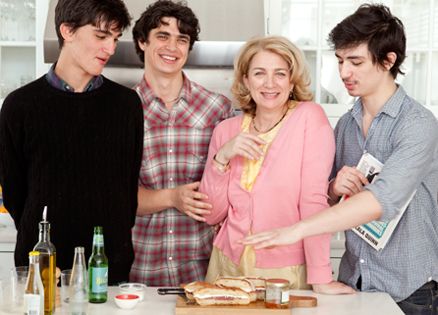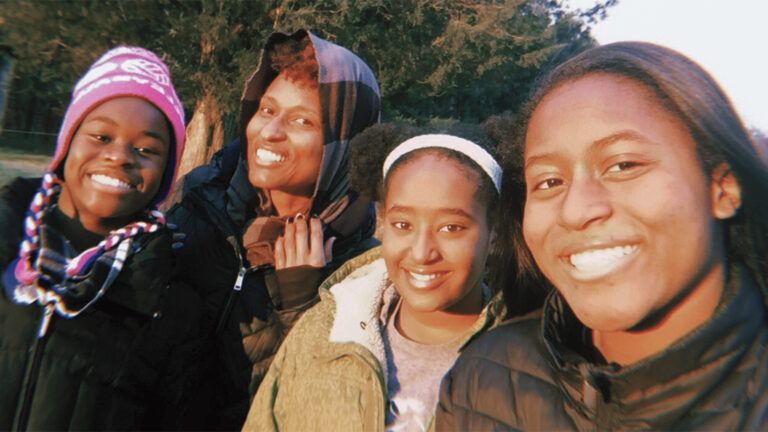Men eat differently from women—they eat more, they eat constantly and they eat passionately.
I should know: I have four brothers and three sons. I remember my mom browning meat for chili and my brothers trooping into the kitchen and eating almost all the beef out of the pan before she could add tomatoes and beans. She could barely get them to sit down for dinner. But she did it.
She gave us the love of not only being nourished but also being together at the table. I’ve tried to do the same with my husband, Richie, and our boys, Calder, Miles and Luca.
My work revolves around food. I write about it, I develop recipes and entire menus, I cohost PBS’s Everyday Food. My true passion, though, is feeding my men. It keeps them healthy and happy, gives them some of their fondest memories and teaches them to take care of themselves—and others.
How can a busy mom create a legacy like that? Serve simple meals, the kind moms everywhere have always made. Anyone who grew up with regular meals remembers those dishes as if they were eaten yesterday.
For me, it’s leftover pork stir-fried with vegetables and served over a pile of rice. I asked my friends to recall their favorite family meals. No one had to stop and think: chicken and dumplings, taco night, pot roast with potato pancakes and applesauce, red beans and rice. Comforting, familiar, tasty.
Instead of being a chore, mealtime can be the foundation of a wonderful relationship with the men in your life, a way to connect during even the most awkward adolescent phases.
Take my oldest, Calder. In high school he asked for an increase in his allowance. I agreed…if he’d take responsibility for the family meal one night a week. That was a big job. He had to plan, cook and keep the kitchen clean.
That first night he was going to make pasta with tomato sauce. He asked, “Mom, is this a clove of garlic?” It was a whole head of garlic. I couldn’t throw him to the wolves. So every week I’d sit in the kitchen and teach him the basics: “Put the chickens head-to-toe on the rack. And with the broccoli, don’t cut off the stalks and toss them. Peel them and slice them into coins.” (I’m a big believer in stretching my resources. I got that from my mom.)
In college Calder moved into his first apartment. I got a lot of phone calls. “Quick question,” he’d say. “You know that thing you do with pork chops and onions and apples?”
“Yes,” I’d say, “brown the chops, take them out of the pan, throw in the onions then the apples.” I figured out “quick question” meant “Don’t bother with all the usual parental stuff, asking about my grades or whether I have a girlfriend.” We’d start with food and then he’d tell me about his classes and who he was hanging out with. Boys don’t always want to talk, but they always want to eat. Food is a great conversation starter.
Then there are those lessons that go beyond the food itself. One time in grade school my middle son, Miles, announced, “I’m sick of your bag lunches.”
I was a little hurt at first. But then I thought, I feed him well at breakfast and at dinner; it’s okay to let him get school lunch. Two weeks later, Miles came home from school and asked, “Can I go back to your lunch? And can I have two sandwiches?”
I thought he was going through a growth spurt. But he kept asking for more and more food, so I said, “What’s going on?” He told me his buddy was dropped off at 7:00 a.m. and had to have school breakfast and lunch. “I just want to give him some good food,” Miles said. I was so moved by my son’s generous spirit.
I know it’s hard for a busy family to have dinner together every night. There are times in our house when there’s a pot on the stove and people just dip in and dip out. One kid’s got soccer. Another is at a friend’s house finishing a school project. But we all make the effort to be together as much as possible.
Start out simple. Choose one meal a week and give each person something to do—get everyone involved. Then sit down and eat. It’s no surprise when you look back through religious writings how important the notion of breaking bread together is. It’s central to all faiths.
Before my guys and I dig into dinner, we hold hands for a moment and say grace. We acknowledge what’s happening in our lives, what we’re worried about, what we’re celebrating, what we’re grateful for. That’s the best thing about family meals—they nourish body and soul.
Try Lucinda’s Italian Pressed Sandwiches and watch Lucinda in a behind-the-scenes look at her photo shoot.
Plus, check out Lucinda’s book, Mad Hungry: Feeding Men and Boys.




